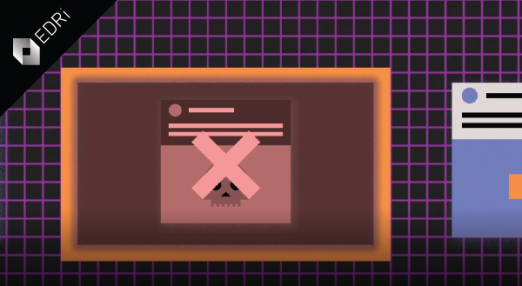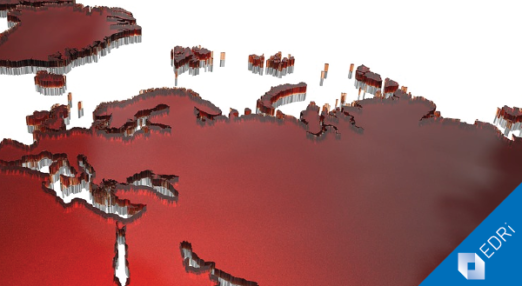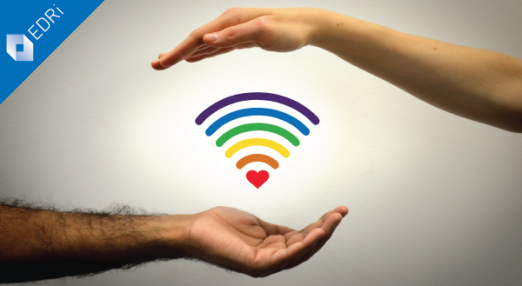Our work
EDRi is the biggest European network defending rights and freedoms online. We work to to challenge private and state actors who abuse their power to control or manipulate the public. We do so by advocating for robust and enforced laws, informing and mobilising people, promoting a healthy and accountable technology market, and building a movement of organisations and individuals committed to digital rights and freedoms in a connected world.
Filter resources
-

More responsibility to online platforms – but at what cost?
In the European Commission’s internal note published by Netzpolitik.org on 16 July 2019, the Commission presents current problems around the regulation of digital services and proposes a revision of the current E-Commerce Directive. Such a revision would have a huge impact on fundamental rights and freedoms. This is why it’s crucial for the EU to […]
Read more
-

“SIN vs Facebook”: First victory against privatised censorship
In an interim measures ruling on 11 June 2019, the District Court in Warsaw has temporarily prohibited Facebook from removing fan pages, profiles, and groups run by Civil Society Drug Policy Initiative (SIN) on Facebook and Instagram, as well as from blocking individual posts. SIN, a Polish non-profit organisation promoting evidence-based drug policy, filed a […]
Read more
-

Microsoft Office 365 banned from German schools over privacy concerns
In a bombshell decision, the Data Protection Authority (DPA) of the German Land of Hesse has ruled that schools are banned from using Microsoft’s cloud office product “Office 365”. According to the decision, the platform’s standard settings expose personal information about school pupils and teachers “to possible access by US officials” and are thus incompatible […]
Read more
-

The first GDPR fines in Romania
The Romanian Data Protection Authority (DPA) has recently announced the first three fines applied in Romania as a result of the enforcement of the EU General Data Protection Regulation (GDPR).
Read more
-

New privacy alliance to be formed in Russia, Central and Eastern Europe
Civil Society advocates from Russia, and Central and Eastern Europe have joined forces to form a new inter-regional NGO to promote privacy in countries bordering the EU.
Read more
-

The digital rights of LGBTQ+ people: When technology reinforces societal oppressions
Online surveillance and censorship impact everyone’s rights, and particularly those of already marginalised groups such as lesbian, gay, bisexual, transgender and queer and others (LGBTQ+) people. The use of new technologies usually reinforces existing societal biases, making those communities particularly prone to discrimination and security threats. As a follow-up to Pride Month, here is an […]
Read more
-

E-Commerce review: Technology is the solution. What is the problem?
This is the second article in our series on Europe’s future rules for intermediary liability and content moderation. You can read the introduction here. When it comes to tackling illegal and “harmful” content online, there’s a major trend in policy-making: Big tech seems to be both the cause of and the solution to all problems.
Read more
-

Real Time Bidding: The auction for your attention
The digitalisation of marketing has introduced novel industry practices and business models. Some of these new systems have developed into crucial threats to people’s freedoms. A particularly alarming one is Real Time Bidding (RTB). When you visit a website, you often encounter content published by the website’s owner/author, and external ads. Since a certain type […]
Read more
-

EU worries over the possibility of losing wiretapping powers
5G telecoms networks could render obsolete the “lawful interception” techniques that police is traditionally using, unless the European Union and national governments take action. This was revealed in internal EU documents obtained by EDRi member Statewatch, that has published a new analysis explaining the issues and calling for a public debate. “It is unsurprising that […]
Read more
-

Regulating online communications: Fix the system, not the symptoms
Our digital information ecosystem fails to deliver the communications landscape needed to sustain our democracies. In a problem analysis, EDRi member Bits of Freedom introduces and disentangles some of the key concepts and issues surrounding the dominant role of platforms and the resulting harms to our freedom of expression.
Read more
-

Fighting online hatespeech: An alternative to mandatory real names
The internet facilitates debates: People around the globe can connect at almost zero cost, and information and opinions that would otherwise hardly be noticed can go viral through social media. However, services like Twitter and Facebook can also be used for targeted defamation. Especially people who belong to minorities or endorse views outside the mainstream […]
Read more
-

Open letter demands interoperability of the big online platforms
On 21 May 2019, EDRi observer La Quadrature du Net, along with 70 other organisations, including some EDRi members, sent a letter asking the French government and members of the Parliament to force web giants (Facebook, Youtube, Twitter…) to be interoperable with other online services. The purpose is to allow users of these platforms to […]
Read more
